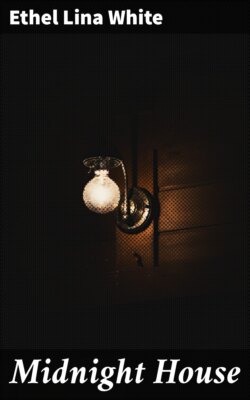Читать книгу Midnight House - Ethel Lina White - Страница 14
На сайте Литреса книга снята с продажи.
—III—
ОглавлениеTable of Contents
"I want to see the meccano shop," announced Barney.
"No, you can't stop anywhere," Elizabeth told him, glancing at her watch. "We've got to hurry. Come on."
Instead of obeying her, he scampered across the road and tried to clutch the coping of a wall which was greened with damp. He was too small to look over it, but he could hear the sound of water churning through an outlet on the other side.
"I want to see the little lost river," he said imperiously. "Help me up—you."
Elizabeth wanted to humour him, for she could understand the fascination of that dark current rushing underground; but she dared not risk a small active boy astride a slippery parapet.
"No," she said firmly.
"Maxine let him," explained Phil.
As she mentioned the name, the change which swept over Barney's face was revealing as it was piteous. He set his small mouth in a tight line, but the tremble of his chin betrayed him. It made Elizabeth realise that he was fretting for the governess whose place she had usurped.
"I'm the miserablest boy in the whole world," he said gloomily. "I'm going to make a hole in the water."
His white peaked face glimmered through the gloom like a small mask of Tragedy, while Phil explained the situation.
"He says he's going to frighten you away, then Maxine will come back."
"He won't find me so easy to frighten."
As Elizabeth made her boast, she noticed that the children exchanged glances of understanding. It was evidence of a secret alliance, rendered ominous by the time and place.
"He's partial to Maxine," went on Phil, who borrowed expressions from the kitchen.
Looking at the boy's sullen face, Elizabeth felt an absurd pang of jealousy.
"Tell me something about this wonderful Maxine," she urged.
"She'll come to want," prophesied Phil. "She wasted her plates."
"Perhaps she wasn't hungry," said Elizabeth in an effort to placate Barney.
As he remained obstinately silent, she asked Phil another question.
"Were you very sorry when she left, Philippa?"
"No, I like my darling Miss Feathers best of all."
Phil hooked her weight on to Elizabeth's arm and looked up at her with the adoring smile which was for wholesale distribution, before she added: "But Maxine used to sing and dance to us. I liked that."
Elizabeth was reflecting bleakly that Maxine possessed the valuable quality of entertainment value, when Barney spoke defiantly.
"I'm going to run away from you. I'm going to find Maxine."
Elizabeth was terrified by the threat. If he carried it out, she was doubtful whether she could overtake him, since he dodged and twisted like an electric-eel. To complicate the situation, she dared not leave Phil alone in a twilit slum-quarter while she chased him.
She had horrible visions of returning to the Crescent with the news that one child was lost and the other was choking with bronchitis. It would mean dismissal—and she had lost too many jobs during the short time she had been on the labour market. But even the gravity of the economic position did not compare with the threat of parting with Barney.
Suddenly she felt that the situation was slipping from her control. While Barney was wasting precious time, the light was fading. Already the reflections on the factory windows had died to faint red gleams. There was a smear of twilight over the grey buildings, while a perceptible mist clouded the air and slimed the cobbled road.
As though responsive to the raw chill, Phil began to cough in short, sharp barks.
"Don't yap—you," commanded her brother.
She obligingly changed her key to a sepulchral lower register. Although Elizabeth could not decide whether it were a genuine spasm, she dared not risk any neglect. Yet she could not rid her mind of a suspicion that Phil was working in collusion with Barney. She gave the impression of playing for time as she stared up at her governess with eyes like blue full-moons.
"Barney says there's a black man in our cellar," she said.
Elizabeth forgot her suspicions in a rush of indignation, for she too had been terrorised by that bogey created by nursery-maids. She had been brought up by her grandmother in a tall, dark Victorian house, educated by the governess who taught her mother—and left to the care of servants.
One of these had instilled into her mind terror of the black man who would come up from the cellar, if she cried. She had known the horror of lying under the bedclothes, listening to the creaking of the stairs, while her heart beat like a broken clock...
That black shape which never came was a symbol to her of blind insensate Fear...
"Who told you that?" she asked sharply.
"Barney," repeated Phil.
"It's a wicked lie. There's nothing in the cellar but coals."
"I've seen him," broke in Barney. "He's all black and he's got no face, only glarey eyes. He lives in the empty house."
The sound of a clock striking the quarter-past four told Elizabeth that she had lost her race against time. It would be impossible now to get the children home before the darkness came creeping through the streets. Her only hope was to escape the menace of the river fog. The threat of losing her job—combined with worry about Phil's chest—committed her to a desperate course.
She was forced to take the short-cut home.
